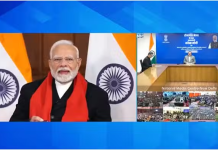The Supreme Court on Thursday asked the Tamil Nadu Governor to consider the mercy petition of A G Perarivalan, a convict in the 1991 Rajiv Gandhi assassination case. A bench of Justices Ranjan Gogoi, Naveen Sinha and K M Joseph disposed of the Centre’s petition regarding a proposal for the release of the convicts, filed by the Tamil Nadu government.
The Centre had on August 10 told the apex court that it does not concur with the Tamil Nadu government’s proposal to release the seven convicts in the Rajiv Gandhi assassination case, saying remission of their sentence will set a “dangerous precedent” and have “international ramifications”.
On August 20, 47-year old Perarivalan alias Arivu had told the apex court that no decision has been taken as yet on his mercy petition filed before the Tamil Nadu Governor over two years ago. He was charged with supplying a 9-volt battery which was allegedly used for the belt bomb that had killed Gandhi and 14 others.
Rajiv Gandhi was assassinated on the night of May 21, 1991, at Sriperumbudur in Tamil Nadu by a woman suicide bomber, identified as Dhanu, at an election rally. Fourteen others, including Dhanu herself, were also killed. This was perhaps the first case of suicide bombing which had claimed the life of a high-profile global leader.
Perarivalan, who is among the seven convicts in the case, had said that he had filed the mercy petition seeking remission or pardon from the Governor under Article 161 of the Constitution. He had filed the mercy petition on December 30, 2015, saying he has suffered more than 24 years of solitary/single confinement.
“As per jail rules, life imprisonment at ground level is only for a maximum of 20 years and thereafter the prisoner is considered for release. Now I have already undergone more than life imprisonment,” his letter had said.
He had also claimed that the probe was not full-fledged and was incomplete and partial. “The main culprits who designed the bomb made of RDX were not nabbed till date. They are scot-free and investigation is still pending into the vital aspects of the crime itself,” he had said in his letter to the Governor.
“The charge sheet of the CBI (Multi-Disciplinary Monitoring Authority -MDMA), which was constituted pursuant to the Jain Commission report for further investigation of foreign hand in the assassination of Rajiv Gandhi, is still pending and the real conspirators are yet to be found.
“There will be no justification in keeping me behind bars even after 25 years of actual punishment when the investigation is itself pending”, Perarivalan’s letter said, giving a detailed outline of the case against him for seeking pardon of his sentence from the Governor.
Convicts Perarivalan, V Sriharan alias Murugan, T Suthendraraja alias Santham, Jayakumar, Robert Payas, P Ravichandaran and Nalini have been in jail for 25 years.
On August 10, the Centre, while holding that it does not concur with the Tamil Nadu government’s proposal to release the seven convicts, had said the case involved the assassination of a former prime minister in a brutal manner in pursuance of a “diabolical” plot carefully conceived and executed by a foreign terrorist organisation. On January 23, the apex court had asked the Centre to take a decision within three months on a 2016 letter of the Tamil Nadu government written on March 2, 2016, seeking its concurrence on releasing the seven convicts.
The apex court had on February 18, 2014, commuted the death sentence of three convicts – Murugan, Santhan and Perarivalan – citing inordinate delay by the executive in deciding their mercy plea. After Gandhi’s assassination on May 21, 1991, the probe was transferred to a Special Investigation Team of the CBI on the request of the Tamil Nadu government.
The SIT had named 41 accused in its charge sheet – including 12, who died in the blast and three who were absconding – before a TADA court in Chennai. The prolonged trial culminated in 1998 when the TADA court sentenced 26 of the accused to death. In May 1999, the apex court had upheld the death sentence of four, including Murugan, Santham, Perarivalan and Nalini, commuted the death sentence of three to life, and freed the remaining 19.
In April 2000, the Tamil Nadu Governor had commuted the death sentence of Nalini on the basis of state government’s recommendation and an appeal by Rajiv’s wife and then Congress President Sonia Gandhi. The death sentence of remaining three convicts were commuted in February 2014 by the apex court on the ground of inordinate delay of 11 years in deciding the mercy petitions.PTI














































